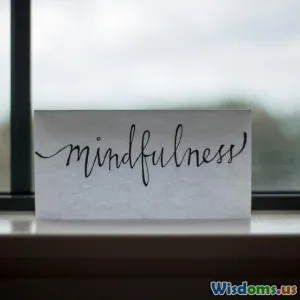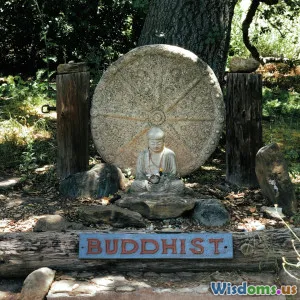
5 Myths About Enlightenment That Are Holding You Back
8 min read Debunking five common myths about enlightenment that prevent personal growth and true understanding. (0 Reviews)
5 Myths About Enlightenment That Are Holding You Back
Introduction
Enlightenment is a word that evokes mystery, reverence, and aspiration, especially in spiritual circles. Across cultures and traditions, it has been described as the ultimate state of awakening or transcendence, a pinnacle of human consciousness. But despite its revered status, enlightenment often remains an elusive concept, overshadowed by myths and misunderstandings that actually hamper many from moving forward on their spiritual or personal growth journeys.
Imagine wanting to reach the summit of a mountain, but being misled by a distorted map that sends you in circles or into dead ends. These myths play a similar role. They cloud judgment, create unrealistic expectations, and reinforce misconceptions, making genuine progress seem impossible. In this article, we'll expose five pervasive myths about enlightenment—debunking them with insights from psychology, spiritual teachings, and real-world examples—and show how understanding the truth can liberate you to grow authentically.
Myth 1: Enlightenment Means Permanent Bliss or Happiness
One of the most romanticized ideas about enlightenment is that it guarantees endless happiness and bliss, an eternal sunshine state. This myth stems partly from modern media, which tends to portray spiritual awakening as a continuous elevated emotion.
Reality: The enlightened state is not immune to challenges, discomfort, or the natural fluctuations of life. Instead, it involves a deeper equanimity—a balanced acceptance that transcends transient moods.
Supporting Insights:
- Buddhist teachings highlight dukkha (suffering or unsatisfactoriness) as a universal human experience but position enlightenment as freedom from attachment to these fluctuations rather than their eradication.
- Neuroscientific research shows that emotion regulation improves with meditation and mindfulness practices associated with enlightenment, allowing the practitioner to remain grounded but not necessarily in constant bliss.
Example: Thich Nhat Hanh, the renowned Zen master, spoke openly about his personal experiences with suffering and sadness despite his enlightenment, emphasizing mindful awareness rather than chasing happiness.
Myth 2: Enlightenment Is A Final Destination—Once Reached, You're 'Done'
Many believe that enlightenment is a rigid end point—a state you arrive at and then permanently stay in. This static view can create pressures and self-judgment.
Reality: Enlightenment can be better understood as a dynamic process or ongoing unfoldment rather than a fixed endpoint. Spiritual growth is continuous and evolving.
Supporting Insights:
- The concept of Bodhisattvas in Mahayana Buddhism, who remain in the world to help others while continuously deepening their own understanding, illustrates this lifelong journey.
- Psychologist Robert Kegan's model of adult development emphasizes that self-transcendence and complex meaning-making unfold over a lifetime.
Example: Eckhart Tolle speaks about awakening not as a static state but a lifetime practice of returning to presence and awareness, with new layers unveiling over time.
Myth 3: Enlightenment Is Only For The 'Chosen Few' or Spiritual Elite
Many feel that enlightenment is reserved for monks, sages, or people with extraordinary spiritual gifts, which can lead to feelings of exclusion or inferiority.
Reality: Enlightenment is accessible to all human beings. It is less about innate talent and more about commitment, practice, and openness.
Supporting Insights:
- The democratization of mindfulness and meditation practices globally has produced countless cases of ordinary people experiencing profound insights.
- Neuroscience shows that neuroplasticity—the brain’s ability to change—supports learning and transformation, debunking fixed notions of ability or “specialness.”
Example: Jon Kabat-Zinn's Mindfulness-Based Stress Reduction (MBSR) programs have helped thousands in hospitals and schools cultivate meaningful awareness without any spiritual prerequisites.
Myth 4: Enlightenment Removes All Desires and Makes You Passive
Some think enlightenment means renouncing all desires and becoming emotionless or indifferent to life.
Reality: Enlightenment modifies our relationship with desire rather than eliminating it. Instead of being driven compulsively by craving or aversion, enlightened individuals experience desire with awareness and freedom.
Supporting Insights:
- In Vedantic philosophy, desires aligned with dharma (righteousness and duty) integrate harmoniously with enlightenment.
- Psychological studies show that motivation with conscious values—rather than unconscious drives—enhances wellbeing.
Example: The Dalai Lama balances deep compassion and active engagement in worldly issues, demonstrating that enlightened living involves purposeful action, not detachment from life.
Myth 5: You Must Give Up Your Identity and Ego to Be Enlightened
The radical thought that you must obliterate your ego to reach enlightenment causes many to feel confused and lose sight of practical steps.
Reality: Enlightenment doesn’t mean annihilating the ego but recognizing its nature, limitations, and not being ruled by it blindly.
Supporting Insights:
- Jungian psychology highlights integrating ego as essential to individuation and wholeness.
- Spiritual teachers such as Ram Dass talk about the ego’s relative role—it’s a tool, not the self’s totality.
Example: Modern mindfulness practices teach observing the ego’s narratives without identification, helping to transform rather than eradicate selfhood.
Conclusion
Myths about enlightenment permeate popular culture and even some spiritual teachings, yet they often hold sincere seekers back from realizing authentic growth. Understanding that enlightenment is not perpetual bliss, a fixed endpoint, an exclusive privilege, nor a state of ego death or emotional absence, liberates us.
Enlightenment is a rich, complex, and deeply personal journey. It offers enhanced awareness, freedom from habitual suffering, and integration of self with reality—but it is also human, involving ongoing learning, challenges, and engagement with life.
By dismantling these myths and approaching enlightenment with clarity and realism, you can open the door to meaningful transformation. The path is available to every seeker willing to embark with openness, dedication, and courage.
As the ancient proverb says, "The journey of a thousand miles begins with a single step." Taking that step armed with truth rather than illusion might just be your most enlightened act yet.
If you're ready to deepen your understanding, consider starting a daily mindfulness practice or exploring a teaching lineage that resonates with you. True awakening begins in the present moment, not in distant ideals.
Rate the Post
User Reviews
Popular Posts




















